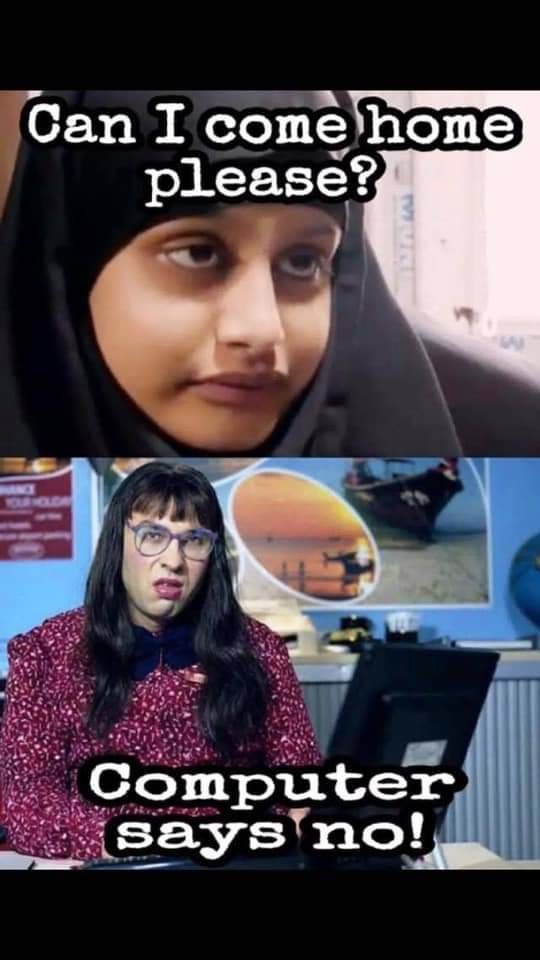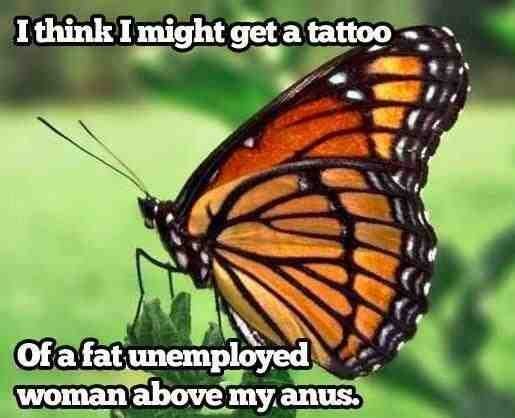-
Content Count
8,327 -
Joined
-
Last visited
-
Days Won
19
Content Type
Profiles
Forums
Gallery
Articles
Gun Dealer's and Fieldsports Shop's
Reloading Room
Blogs
Calendar
Store
Classifieds
Posts posted by Blackbriar
-
-
Congratulations and good luck mate !
(I can remember my wedding like it was yesterday..............I wish it was tomorrow, I wouldn't turn up !)
-
 1
1
-
 3
3
-
-
1 hour ago, Our team said:
Fuk are they ... They control it dude. When have you ever known them get involved in political religious wars.??? They not as daft as you seen to think. Yes they arsh and bind there young feet and even install disapline to a greater degree than most. They take no shit and there fire power and armery are the best on earth. What are we our army is in collapse we can't even look after our own inured comrades and we dismantling war planes and not growing. Cos we think America will help us out.
That's a Japanese tradition, not Chinese.
-
1 hour ago, Our team said:
Actually. Its a country ruled by England and America. We own all gold and jewellery mines. All theyve got left is begging.? Our moneys help but will never solve it. Its the only industry they have left
Africa is.actually.54 countries.that.make up.a.continent.
-
 1
1
-
-
Under white rule, Zimbabwe/Rhodesia was known as the bread basket of Africa. They has tremendous agricultural capacity and natural resources, which were used to the fullest. Years of black rule under Mugabe and his successor (affectionately known as "The Crocodile" !) and they need a wheelbarrow full of money to buy a loaf of bread.......if there's any in the shops !
Most African countries are ruled by corrupt, authoritarian despots, more intent on perpetuating tribal wars than governing for the benefit of their citizens - many of them rank among the most merciless dictators the world has ever known - Mugabe, Amin and Gaddafi spring to mind, but the list is long and lamentable. Nigerian corruption has always been at mythical levels, and even the great "rainbow nation" of South Africa has been reduced to a festering 5hithole, riven by crime and violence of epic proportions.
Decades of Western aid and assistance, which must run into hundreds of billions of pounds, and for what ? No discernable difference that I can see !
-
 2
2
-
 1
1
-
-
The good Lady is prescribed it, and takes iit daily.
VitD is particularly important for women, as it aid s the absorption and metabolism of calcium, which prevents osteoporosis.
-
 3
3
-
-
5 minutes ago, Welsh_red said:
Flip side is I've had some great generosity on here . Forgive me for forgetting the names but 1 guy send me some bands for my catapult and when I said I'd be letting the kids have a go he sent me 2 catapults for each of the kids . All for nothing . Another guy on here sent me a lovely sheath for a knife I bought for my dad for absoluty nothing. One guy sent me a copy of "fur fish & game" when I asked about it's availability in the UK. Then there was the guy who lent me his only copy of glen waters DVD to watch. Their is shitbags all over the place but theirs plenty of genuine guys on here
I, too, have been gifted some class items for my club and I feel bad that one of our own would behave like this fella has.
-
 1
1
-
-
5 minutes ago, micky said:
Set for Pike and caught already .

That's not the right type of soil for pike...........
-
How many transgenders does it take to change a light bulb ?
Just one..........but they have to live in the dark for two years, to make sure they want it changed and get the opinions of two independent electricians !
-
 2
2
-
-
From a recent Guardian article...........
"French President Emmanuel Macron should have known his comments about Africa at the G-20 summit this month would spark an angry backlash. Responding to a reporter’s question as to why there is no Marshall Plan for the continent, he cited “civilizational” problems that are different from those faced by Europe after World War II: “Failing states, complex democratic transitions, the demographic transition.” Later, he added that “in some [African] countries today seven or eight children [are] born to each woman.”
Accusations of racism and ahistoricism piled on quick, flooding social media and prompting some commentators to declare Macron’s honeymoon as a liberal icon over. This was entirely predictable. In part because of the historical trauma of slavery, colonialism, and the racist discourse they fostered, when white people use terms like “civilizational” in reference to problems in Africa, what many black Africans hear is: “Your civilization is inherently inferior to ours; it is backward and primitive.”
Such reactions are understandable and even important in checking harmful narratives about the continent. But by assuming the worst of Macron — and refusing to engage with his broader analysis of Africa’s foibles — his critics are guilty of the same intellectual laziness they often ascribe to those parroting easy stereotypes about Africa. Macron pointed to three major challenges facing the continent today: demography, democracy, and failing states. He was right on all counts.
Macron pointed to three major challenges facing the continent today: demography, democracy, and failing states. He was right on all counts.
On the demographic point, some critics zeroed in on Macron’s erroneous claim that the average African woman has “seven or eight” children; in fact, the only African country with such a high fertility rate is Niger, with 7.6 children per woman. But if the French president exaggerated slightly, his underlying point about dangerous demographic trends was sound. In 19 of Africa’s 54 countries, the average woman has five or more children, while in 36 of them the fertility rate is 4.0 or higher. These are worrying numbers on a continent where there are already 233 million hungry or undernourished people in the sub-Saharan region alone. Add in the fact that the number of Africans living in extreme poverty rose from 280 million in 1990 to 330 million in 2012 “because of population growth,” according to a 2016 World Bank study, and it becomes even clearer that the continent’s generally high fertility rates need to be addressed frankly and urgently.
Strong population growth could have been an engine for development if the creativity of Africans were being adequately harnessed. But poor governance and inadequate infrastructure — itself a product of poor governance — have turned it into a disaster waiting to happen. The rosy economic future projected during the heyday of the “Africa rising” buzz in the early 2000s now looks far too optimistic: Recent World Bank projections have sub-Saharan Africa’s economies growing “only slightly” above population growth, “a pace that hampers efforts to boost employment and reduce poverty.” That’s not racism; that’s reality.
Macron’s point about “failing states” is also borne out by the facts. According to the 2017 Fragile States Index, 14 of the 20 most fragile countries in the world are in Africa: Burundi, Central African Republic, Chad, Democratic Republic of the Congo, Ethiopia, Eritrea, Guinea, Guinea-Bissau, Niger, Nigeria, Somalia, South Sudan, Sudan, and Zimbabwe. These countries have a combined population of roughly 530 million people, which means that about half of all Africans live in a fragile state. And insecurity is on the rise. A 2016 report from the Mo Ibrahim Foundation, which surveys African perceptions of governance, reveals a “pronounced and concerning” drop in “safety and rule of law” in 33 countries, home to almost two-thirds of the continent’s population. These problems cannot be downplayed as isolated cases. They form a pattern — and a particularly worrying one for the millions of Africans forced to live in a state of constant insecurity.
Finally, Macron’s comment about “complex democratic transitions” was also a pretty obvious truth. The journey toward democracy in Africa has not been smooth. Near the end of the Cold War, in 1989, there were only two “electoral democracies” — countries that held regular elections — on the continent, according to the U.S.-based nonprofit Freedom House. By 2007, that number had risen to 24. But over the last decade it has fallen to 20 as countries like Mali, Niger, and Mozambique slid back toward authoritarianism. Others, like Sudan, Eritrea, and Angola, have remained steadfastly authoritarian. Zambia has also been in the news recently as its government has grown increasingly repressive.
Even among those nations that are classified as electoral democracies, few enjoy the kind of good governance that popular sovereignty is supposed to produce: rule of law, respect for human rights, and balanced economic development. In my country, Nigeria — Africa’s most populous nation and democracy — hundreds of unarmed civilians have been killed by state security forces in the past two years, including members of a Shiite religious group and pro-Biafra agitators advocating for the secession of southeastern Nigeria. The country’s corruption and inequality are legendary.
So who or what is to blame for all this? Whenever a white politician or other high-profile figure portrays Africa in an unflattering manner, a common reaction among African intellectuals is to emphasize colonialism and slavery as the “root cause” of whatever problem is being highlighted. Disagreement with this viewpoint is typically attributed to racism or a desire to ignore the crimes of Europe’s imperial past.
There is no doubt that post-colonial economic and societal structures inherited by Africans were seriously flawed and geared toward exploitation. Africa was also disadvantaged from the start, because at the time of independence its economies had been underdeveloped by the European colonial powers. But this is not the whole story. Countries like Malaysia, Singapore, and Taiwan were colonies until the mid-20th century, but all have since done pretty well for themselves. So have the oil-rich states of the Persian Gulf, such as Kuwait, the United Arab Emirates, and Qatar — all former British “protectorates” and all now boasting the kind of ultramodern infrastructure many British cities can only envy. What is preventing Equatorial Guinea, which has a population of 1.2 million and is sub-Saharan Africa’s third-largest producer of oil and gas, from becoming a developmental marvel in the model of the Gulf?
What is preventing Equatorial Guinea, which has a population of 1.2 million and is sub-Saharan Africa’s third-largest producer of oil and gas, from becoming a developmental marvel in the model of the Gulf?
Of course, Africa is “not a country” — but rather a diverse continent of 54 countries at varying levels of development. But the reality is that in far too many of these countries we see the same problems over and over: mass poverty, gross inequality, endemic corruption, weak institutions, generally inefficient and insensitive governance, and overpopulation in relation to available resources.
Defensiveness and denial are not helping the hundreds of millions of impoverished Africans living in want, insecurity, and fear. At best, this kind of attitude allows Africa’s middle-class intellectuals and privileged classes to avoid the public airing of uncomfortable and sometimes embarrassing truths about the continent where they live. After all, they are the ones who have the time and ability to take to social media and voice outrage anytime they feel that Africa is being slighted.
It is perfectly acceptable for Africans to demand respect from Western leaders. But they should also strive to earn it through economic success — just as Asia has done in recent decades. But to achieve success, we must look inward at the real causes of the problems facing us, rather than constantly blaming them on racism and the legacy of colonialism."
-
 1
1
-
-
14 minutes ago, lurcherman 887 said:
f**k me there must be more wells and schools there than in england.. greedy c**ts
£2 a month for clean water ? I'm moving over there........mines 20 odd quid !
-
 2
2
-
-
I know an old boy who comes from what is now Zimbabwe (but don't tell him that - "I am Rhodesian !")
He says it got its name because there's Zero Industry Mainly Because All Bloody Whites Emigrated.
-
 1
1
-
 2
2
-
-
-
Anyway............back to the OP.
I've learnt so much from this site, it would take too long to list it. I've had my opinions challenged and, occasionally, changed.........and long may it continue to be so !
I contribute to a couple of other forums but, to be honest, they're a bit po-faced and take themselves far too seriously, compared to this place !
-
 1
1
-
 1
1
-
-
Chelsea goalkeeper refuses to leave the pitch, when he is substituted !
How woud the panel have handled this, and what should happen to the goalkeeper &/or manager ?
-
Never shot HFT, so can't help you with that, but for hunting I use 8X mag, as a quick distance guide...........at 30 yards a rabbit's head (side on) cover 2 mildots.
-
The idiots who think these things up are like nappies !
Full of 5hit and difficult to get rid of !
-
 1
1
-
-
Jihadi Jack (FFS !) is a dual national.........this one should be easy to sort !
-
 1
1
-
-
It were great, when I were't lad............
-
 1
1
-
-
1 hour ago, baker boy said:
I'd pull the lever
You pull the lever and there'll be a long queue to hang on his ankles !
-
 1
1
-
 1
1
-
-
Shame we can't take Corbyn's citizenship away !
Treacherous, swivel-eyed lunatic !
-
 4
4
-
 2
2
-
 1
1
-
-
ITV news showed the reporter giving her the letter with the bad news.
Cheered me up no end - her expression was fecking priceless !

-
 2
2
-
 4
4
-
-
Would this extend to grandparents 1,2,3 & 4 ?
-
 1
1
-
-
If I'd gone anywhere near my sainted mum's purse, she'd have knocked seven shades of 5hit out of me !
-
 1
1
-
-
2 minutes ago, Meece said:
You'd think that both parties would tread down on all of those who dont want to toe the party lines . If they want to go in another direction so be it but they should all stand for re-election. They got elected on party manifestos which they are no longer following. Therefore they can no longer claim to represent their constituents. I still don't understand the anti jewish thing in labour. Why are there these anti jewish sentiments? What have the jews done to the labour party? Ps I'm not jewish.
Neither am I, but I'll join the dots for you.
In a nutshell, Labour generally supports Palestine, and the creation of a Palestine homeland, which would threaten the existence of Israel. Corbyn has repeatedly referred to "our friends in Hamas" - widely regarded as a terrorist organisation.
In short, pro-Palestine = anti-Israel.
-
 1
1
-




Netflix, a question?
in General Talk
Posted
My beloved Terrarium TV is back as Cyberflix TV !
Anything that's on Sky, Netflix or Prime is on there..........for free !